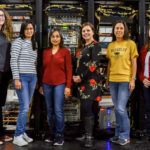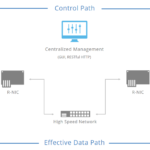The SC20 WINS program offers a terrific opportunity for women in networking help build the SCinet at the conference, working side-by-side with the world’s leading network and software engineers and top network technology vendors. “WINS provides selected candidates with travel support, per diem and full access to the SC conference as part of SCinet, SC’s dedicated high-capacity network infrastructure. They join SCinet teams that coincide with their field of interest, where they work side by side with world-leading network and software engineers from diverse labs and universities, as well as top technology manufacturers, to create an incredibly fast, ephemeral network system.”
New SC Theater at SC19 to Showcase Data-Driven Scientific Applications
SC19 will feature a new SC Theater on the exhibit floor this year. The SC Theater will showcase live presentations that advance modern data-driven scientific applications. “The SC Theater, with seating for 20 and standing room as well, is located next to SCinet on the exhibit floor. It will showcase presentations by students and technologists from the HPC community who are focused on data-driven scientific applications.”
Women in IT Networking team to help build SCinet at SC19
Over at the SC19 blog, Christine Baissac-Hayden writes that seven candidates have been chosen for the Women in IT Networking at SC program. “Since 2015, the Women in IT Networking at SC (WINS) program has supported talented early-to-mid career women who help build the ephemeral high-speed network that powers the annual SC Conference.”
Video: Building SCinet for SC18
The SCinet team is already at work building the world’s fastest temporary network for SC18. The event takes place Nov. 11-16 in Dallas. “How often does an international conference leave its mark on a host city in the form of improved infrastructure? That is exactly what is taking place in Dallas, Texas, as volunteers prepare to build SCinet, the SC conference’s dedicated high-capacity network. SCinet takes one year to plan and culminates in a weeks-long, high-intensity installation process.”
Video: SCinet Prepares World’s Fastest Network for SC18
In this video, the SCinet team prepares the world’s fastest show network for SC18. “With this improved infrastructure in place, SCinet will deliver an anticipated 4.12 terabits per second of network capacity to a million square feet of exhibit space for SC18 in November. When the conference ends, all that SCinet-facilitated fiber will remain in place for future use by Dallas and its millions of visitors.”
SciNet pushes Scientific Boundaries on Climate Research
In this video, W. Richard Peltier and Daniel Gruner describes how SciNet in Canada is powering climate research. To support vital scientific research in fields as diverse as astrophysics, biomedicine and climate science, SciNet beefed up its high-performance computing resources with a Lenovo ThinkSystem supercomputer 10 times more powerful than its predecessor. “The 4.6 Petaflop supercomputer will help Canadian researchers achieve meaningful results in artificial intelligence, astrophysics, climate change, oceanic research and other disciplines using big data.”
Lenovo’s Niagara Cluster Upgrade makes it Fastest Supercomputer in Canada
Today Lenovo unveiled the addition of 1,500 ultra-dense Lenovo ThinkSystem SD530 high-performance compute nodes for Niagara – Canada’s most-powerful research supercomputer. As the demand for high performance computing in quantitative research increases rapidly, the 4.6 Petaflop supercomputer will help Canadian researchers achieve meaningful results in artificial intelligence, astrophysics, climate change, oceanic research and other disciplines using big data.
Mid-career Women help build SCinet with WINS Apprenticeship at SC17
In this special guest feature, Alisa Alering from ScienceNode writes that a team of women engineers helped build SCinet as part of the WINS program at SC17. “A lot of these women come from small schools, and they may not normally get exposed to the technology SCinet provides,” says Meehl. “It’s a great experience technically, but they also get a great professional experience meeting people—that really brings value to your ability to do your job.”
Excelero NVMesh powers Canada’s new SciNet Petascale Storage Facility
Today Excelero announced that SciNet, Canada’s largest supercomputer center, has deployed Excelero’s NVMesh server SAN for the highly efficient, cost-effective storage behind a new supercomputer at the University of Toronto. “For SciNet, NVMesh is an extremely cost-effective method of achieving unheard-of burst buffer bandwidth,” said Dr. Daniel Gruner, chief technical officer, SciNet High Performance Computing Consortium. “By adding commodity flash drives and NVMesh software to compute nodes, and to a low-latency network fabric that was already provided for the supercomputer itself, NVMesh provides redundancy without impacting target CPUs. This enables standard servers to go beyond their usual role in acting as block targets – the servers now can also act as file servers.”
SCinet to “Blow the Doors off the Network” at SC17
SC17 exhibitors are invited to participate in two “blow the doors off the network” events next week to demonstrate the power of SCinet, the high-capacity network built to support the revolutionary applications and experiments that are a hallmark of the SC conference. “Exhibitors with 100 GB connections to their booths are invited to blast peak traffic to and from the exhibit hall floor to illustrate the power of SCinet connectivity within the Colorado Convention Center and to other sites around the world. The events are scheduled 10-11 a.m. Monday, Nov. 13, and 12-1 p.m. Thursday Nov. 16.”












